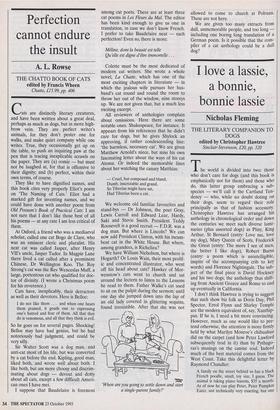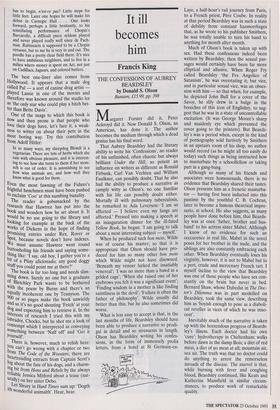I love a lassie, a bonnie, bonnie lassie
Nicholas Fleming
THE LITERARY COMPANION TO DOGS edited by Christopher Hawtree Sinclair-Stevenson, £20, pp. 320 The world is divided into two: those who don't care for dogs (and this book is emphatically not for them) and those who do, this latter group embracing a sub- species — we'll call it the Cartland Ten- dency — who, while no doubt doting on their dogs, seem to regard their role principally as that of fashion accessory. Christopher Hawtree has arranged his anthology in chronological order and down the centuries we meet such diverse lumi- naries (plus assorted dogs) as Pliny, King Arthur, St Bernard (entry: Love me, love my dog), Mary Queen of Scots, Frederick the Great (entry: The more I see of men, the better I like dogs), Robert Burns (entry: a poem which is unintelligible, inspite of the accompanying crib to key words) and Florence Nightingale. The sub- ject of the final piece is David Hockney and his two dogs, the anthology thus shift- ing from Ancient Greece and Rome to end up eventually in California. I don't think Hawtree is trying to suggest that such show biz folk as Doris Day, Phil Spector, Errol Flynn and Shirley Temple are the modern equivalent of, say, Xanthip- pus. If he is, I need a bit more convincing. However, much as one would like to pre- tend otherwise, the attention is more firmly held by what Marilyn Monroe's chihuahua did on the carpet (and how Peter Lawford subsequently trod in it) than by Pythago- ras's musings on the canine soul. Indeed much of the best material comes from the West Coast. Take this delightful letter by Raymond Chandler: A family on the street behind us has .a black French poodle, small, toy size, I guess. The animal is taking piano lessons, $35 a month. As of now he can play Peter, Peter Pumpkin Eater, not technically very exacting, but one
has to begin, n'est-ce pas? Little steps for little feet. Later one hopes he will make his debut in Carnegie Hall . . . One looks forward, perhaps a little hesitantly, to his scintillating performance of Chopin's Barcarolle, a difficult piece seldom played and never played really well since de Pach- man. Rubinstein is supposed to be a Chopin virtuoso, but to me he is very in and out. The poodle has a pretty clear field there. It's nice to have ambitious neighbors, and to live in a milieu where money is spent on Art, not just on Cadillacs, Jaguars, and colored butlers.
The best one-liner also comes from Hollywood. It appears that a male dog called Pal — a sort of canine drag artist played Lassie in one of the movies and therefore was known around the studio lot as 'the only star who could play a bitch bet- ter than Bette Davis'.
One of the snags to which this book is now and then prone is that people who love their dogs have, let's face it, a weak- ness to witter on about their pets in the most boring way. Try this contribution from Adolf Hitler:
In so many ways, my sheepdog Biondi is a vegetarian. There are lots of herbs which she eats with obvious pleasure, and it is interest- ing to see how she turns to them if her stom- ach is out of order. It is astonishing to see how wise animals are, and how well they know what is good for them.
Even the most fawning of the Fuhrer's frightful henchmen must have been pushed to exclaim 'Coo' at this numbing banality. The reader is gobsmacked by the research that Hawtree has put into the book and wonders how he set about it. It would be no use going to the library and looking for example at the back of the Works of Dickens in the hope of finding promising entries under Rex, Rover or Spot, because novels don't have indexes. We must assume Hawtree went round buttonholing his friends and saying some- thing like: 'I say, old boy, I gather you're a bit of a Pliny aficionado; any good doggy stuff you could point me at there?' The book is far too long and needs slim- ming down. Surely no one but a graduate of Bletchley Park wants to be bothered with the poem by Burns and there's an equally incoherent one by Tennyson. The 900 or so pages make the book unwieldy and so it's no good shouting 'Fetch' at your dog and expecting him to retrieve it. In the interests of research I tried this with my Labrador, Chocko, but he shot me a look of contempt which I interpreted as conveying something between `Naff off and 'Get it Yourself.
There is, however, much to relish here: You can't go wrong with a chapter or two fromThe Code of the Woosters; there are neartrending extracts from Captain Scott's log about the fate of his dogs, and a charm- ing bit from Hans and Rebels by the always reliable Jessica Mitford about a tease (nat- urally) on her sister Debo. Let Sleary in Hard Times sum up: `Dogth Ith wonderful animalth'. Hear, hear.



































































 Previous page
Previous page